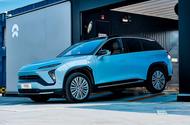Nio’s Power Swap stations don’t require as large a grid connection as a standard fast charger
Chinese EV brand “extremely keen” on UK but requires service partners and Power Swap stations
Chinese EV brand Nio will only launch in the UK once it has the infrastructure in place to offer a “fantastic” user experience – including a number of its innovative battery swap stations.
That’s according to Nio UK boss Matt Galvin, who told Autocar that discussions were ongoing with potential service partners and for sites for the Power Swap battery change stations.
Nio expanded into Europe in late 2021 and is currently active in Norway, Germany, the Netherlands, Sweden and Denmark. Autocar understands that 2024 has been targeted for a launch in the UK.
But asked about the date, Galvin said: “We’re extremely keen to launch but we want to make sure we only launch when we’re ready, and we have the cars, partners that can service the cars and the ability to offer a great community experience.
“The benefit of being in the second wave of expansion is that we can learn from the initial European launch. We’ve learned how important infrastructure is, and that preparation in that area is key to making sure we offer a user experience that is fantastic from day one.”
As with other European markets, Nio will operate a direct sales model in the UK, with online purchases supported by a number of Nio Stores where customers can see and test cars, and Galvin said talks were ongoing with partners to ensure servicing arrangements were in place.
Galvin added that the firm was committed to having a number of Power Swap stations, which can swap a battery pack in a Nio car for a new one in under five minutes. Galvin said that other European markets have shown “just how important Power Swap is as a differentiating factor”.
One challenge for Nio in Europe has been the speed with which it can secure locations for Power Swap stations. While the process of securing permits can take weeks in China, the paperwork has taken several months in Germany. There are also challenges in the UK with securing both sites and grid connections.
Galvin declined to say how many Power Swap sites the firm wanted to have ready for a UK launch, but said: “They will be prioritised in terms of connecting major cities on trunk roads, and then we’ll look to expand into urban environments where users might not have access to off-street parking. They can use Power Swap stations like petrol stations.”
Because they store battery packs that can then be charged slowly, Power Swap stations don’t require as large a grid connection as a standard fast charger, but Galvin noted many of the sites will also offer traditional EV charging.
“The logic for investing in Power Swap infrastructure is that we’re a user-centric brand,” said Galvin. “For mass adoption of electric vehicles you have to make it as easy as possible. At the moment, some people don’t see it as being particularly easy, but Power Swap brings a new dimension.”
Nio cars will be offered in the UK on a Battery-as-a-Service (BaaS) model, with users leasing the batteries so that they can be swapped regularly. Galvin said that addressed another “inhibitor” for EV buying by reducing the price of a car and guaranteeing a minimum state of health for battery packs.
Nio is planning a three-car line-up for the initial UK launch, which will grow rapidly in the coming years. The firm’s original platforms were not designed with right-hand drive in mind and have had to be adapted, but new models such as the recently revealed EL6 SUV use a new platform that enables easier RHD conversion.
“The product life cycle is much shorter for Chinese EVs – it’s three years, typically,” added Galvin. “The rate of advancement is ferocious. But we’re a global brand. We’ve got R&D in Oxford, and design and engineering in Germany. The EL6 was designed for the European market. It’s not about bringing a Chinese car for the Chinese market and hoping it works in Europe.”
Galvin added that Nio’s UK operation would also focus on developing a community of users through the firm’s app. In China, Nio owners can earn points and take part in a number of community events.
“We need to have differentiators – or else we’re just another new electric car brand,” said Galvin. “The whole community aspect is really important to differentiate us, and the closeness of the community enables us to deliver something really different. You don’t just buy a car, you become part of a community.
“We’re already seeing a strong community develop in our European markets, so we know we can do it. It will be different to China, because China is a unique market. We’ll have smaller, localised events where you can really tap into the local community.”







